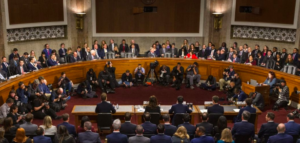 There is credible news that a Senate version of the Workforce Innovation Act (H.R. 7307) will likely be introduced in early July by Senator Wyden (D-OR) and Senator Blackburn (R-TN). Like the House bill, the Senate bill would scale up community-based workforce programs, including partnerships between Community Health Centers and schools, preceptorships, and career laddering programs. NACHC is currently working to add additional Republican cosponsors to the House bill and Republican co-leads to the Senate bill.
There is credible news that a Senate version of the Workforce Innovation Act (H.R. 7307) will likely be introduced in early July by Senator Wyden (D-OR) and Senator Blackburn (R-TN). Like the House bill, the Senate bill would scale up community-based workforce programs, including partnerships between Community Health Centers and schools, preceptorships, and career laddering programs. NACHC is currently working to add additional Republican cosponsors to the House bill and Republican co-leads to the Senate bill.
State’s Labor Force Hits New High, Unemployment Stays Stable
Pennsylvania’s unemployment rate remained unchanged over the month at 3.4% in May, the Department of Labor and Industry announced last Friday. This was the eighth consecutive month at 3.4%. The U.S. unemployment rate rose by one-tenth of a percentage point from its April rate to 4.0%. The state’s unemployment rate was one-tenth of a percentage point above its May 2023 level of 3.3%, while the national rate was up three-tenths of a percentage point over the year. Pennsylvania’s civilian labor force – the estimated number of residents working or looking for work – was up 9,000 over the month and hit a record high of 6.6 million. Pennsylvania’s total nonfarm jobs were up 19,800 over the month to a record high of 6,167,700, setting the tenth consecutive record high for Pennsylvania’s jobs count.
Pennsylvania Finally Passes Telemedicine Law
 The House and Senate approved telemedicine legislation this week, sending the bill to the Governor for his signature. The legislation, SB 739, amends Title 40 (Insurance) of the Pennsylvania Consolidated Statutes, in regulation of insurers and related persons generally, providing for telemedicine. This legislation does not impact the telemedicine requirements for Medicaid recipients per MA Bulletin 99-22-02.
The House and Senate approved telemedicine legislation this week, sending the bill to the Governor for his signature. The legislation, SB 739, amends Title 40 (Insurance) of the Pennsylvania Consolidated Statutes, in regulation of insurers and related persons generally, providing for telemedicine. This legislation does not impact the telemedicine requirements for Medicaid recipients per MA Bulletin 99-22-02.
An Introduction to Philanthropy Supporting Rural Aging
 This resource from the nonprofit Grantmakers in Aging offers guidance on private nonprofit grant funds for rural aging work, with a look at the scale of current funding, rural assets, sustainability, and partnership building. Issues related to rural aging are highlighted, including cultural sensitivities, transportation, broadband, housing, institutional care, and social isolation.
This resource from the nonprofit Grantmakers in Aging offers guidance on private nonprofit grant funds for rural aging work, with a look at the scale of current funding, rural assets, sustainability, and partnership building. Issues related to rural aging are highlighted, including cultural sensitivities, transportation, broadband, housing, institutional care, and social isolation.
Is Rural Emergency Hospital the Best Option for You?
The FORHP-funded Rural Emergency Hospital Technical Assistance Center (the Rural Health Redesign Center) provides a recording of the June 6 webinar. Technical experts discuss a new federal designation, the Rural Emergency Hospital, a provider type designed to address concerns that some rural hospitals would not be able to sustain operations and could be at risk of closure. The Rural Health Redesign Center provides free financial, clinical and operational assessments to facilities considering the REH designation to inform their decision making. The session includes two CEOs who consulted with the Center and decided to convert, and one CEO who went through the process and decided against converting.
Call for Nominations to the Physician-Focused Payment Model Technical Advisory Committee
– Submit by July 10. The Government Accountability Office (GAO) is accepting nominations for the Physician-Focused Payment Model Technical Advisory Committee (PTAC). This independent federal advisory committee consists of eleven members from a wide-range of backgrounds who make recommendations to the Secretary of Health and Human Services (HHS) on stakeholder-submitted physician-focused payment models and related topics. The group is supported by staff from the Office of the Assistant Secretary for Planning and Evaluation (ASPE) within HHS. Last year, the group held meetings in September addressing challenges facing patients and providers in rural communities, approaches for incorporating rural providers in provider-based total cost of care (PB-TCOC) model design, provider perspectives on payment issues related to rural providers in PB-TCOC models, incentives for increasing rural providers’ participation in PB-TCOC models, and successful interventions and models for encouraging value-based transformation in rural areas.
Call for nominations for a CMS Maternal Health Technical Expert Panel
 – Submit by July 12. The Centers for Medicare & Medicaid Services (CMS) seeks nominations for a Maternal Health Technical Expert Panel (TEP) of approximately 20 individuals who will provide input on the expansion of the Maternal Morbidity Structural Measure (MMSM) and expansion and scoring methodology for and awarding of the Birthing-Friendly Hospital Designation. The MMSM assesses whether or not a hospital participates in a Statewide or National Perinatal Quality Improvement Collaborative initiative and implements patient safety practices and/or bundles related to maternal morbidity. The Birthing-Friendly Hospital Designation is currently awarded to hospitals and health systems based on their positive response to the MMSM. CMS seeks nominations from individuals with differing areas of expertise and perspectives, including clinical experts in maternal care, chairs of obstetrical/gynecologic departments, hospital administrators, perinatal quality improvement experts, health equity and birth justice experts, statistical and performance measurement experts, and consumer/patient/family (caregiver) experts. Send questions to the Maternal Quality inbox at cmsmaternalquality@yale.edu.
– Submit by July 12. The Centers for Medicare & Medicaid Services (CMS) seeks nominations for a Maternal Health Technical Expert Panel (TEP) of approximately 20 individuals who will provide input on the expansion of the Maternal Morbidity Structural Measure (MMSM) and expansion and scoring methodology for and awarding of the Birthing-Friendly Hospital Designation. The MMSM assesses whether or not a hospital participates in a Statewide or National Perinatal Quality Improvement Collaborative initiative and implements patient safety practices and/or bundles related to maternal morbidity. The Birthing-Friendly Hospital Designation is currently awarded to hospitals and health systems based on their positive response to the MMSM. CMS seeks nominations from individuals with differing areas of expertise and perspectives, including clinical experts in maternal care, chairs of obstetrical/gynecologic departments, hospital administrators, perinatal quality improvement experts, health equity and birth justice experts, statistical and performance measurement experts, and consumer/patient/family (caregiver) experts. Send questions to the Maternal Quality inbox at cmsmaternalquality@yale.edu.
MedPAC June Report to Congress Highlights Rural Considerations for Medicare Advantage Provider Networks
As part of its mandate from Congress, the Medicare Payment Advisory Commission (MedPAC) reports each June on improvements to Medicare payment systems and issues affecting the Medicare program, including changes to health care delivery and the market for health care services. This year’s report addresses approaches for updating clinician payments and incentivizing participation in alternative payment models, rural considerations for network adequacy standards and prior authorization in Medicare Advantage, assessing health care utilization data sources for Medicare Advantage enrollees, paying for software technologies in Medicare, and Medicare’s Acute Hospital Care at Home program.
Deadline for Disputes Under No Surprises Act Extended
The Departments of Health and Human Services, Labor, and the Treasury announced that providers, facilities, and providers of air ambulance services whose ability to timely initiate open negotiation under the No Surprises Act was impacted by the Change Healthcare cybersecurity incident in February may initiate negotiations for independent dispute resolutions at any point between 6/14/2024 and 10/12/2024, regardless of when the payment or notice of denial of payment and disclosures were transmitted. To take advantage of this exception period, providers must furnish an attestation that their ability to initiate a timely open negotiation for an item or service was impacted by the effects of the cybersecurity incident alongside the standard open negotiation initiation form.
HHS Finalizes Final Rule Establishing Disincentives for Health Care Providers Who Have Committed Information Blocking
The Department of Health and Human Services (HHS) agencies, including the Office of the National Coordinator for Health Information Technology (ONC), the Centers for Medicare & Medicaid Services (CMS), the Office of Inspector General (OIG) released the 21st Century Cures Act: Establishment of Disincentives for Health Care Providers That Have Committed Information Blocking (Disincentives Final Rule). Information blocking by healthcare providers is when they engage in practices they knew were unreasonable and likely to interfere with, prevent, or materially discourage the access, exchange, or use of electronic health information (EHI), except as required by law or covered by a regulatory exception. This final rule establishes disincentives for Medicare-enrolled providers determined by the OIG to have engaged in information blocking. Specifically, under the Medicare Promoting Interoperability Program, hospitals found to have committed information blocking would no longer be a meaningful user, so they would not receive the program’s positive payment adjustment. Critical Access Hospitals would have their payments reduced from 101% to 100% of reasonable costs, while clinicians in Medicare’s Merit-based Incentive Payment System (MIPS) would receive a score of zero in the MIPS Promoting Interoperability performance category. Under the Medicare Shared Savings Program (SSP), accountable care organizations (ACOs) or providers participating in the ACO that commit information blocking may be ineligible to participate in SSP for at least one year and may not receive revenue they may have earned through the program. ONC and CMS released a fact sheet and Frequently Asked Questions which provide an overview of select provisions of the final rule.
